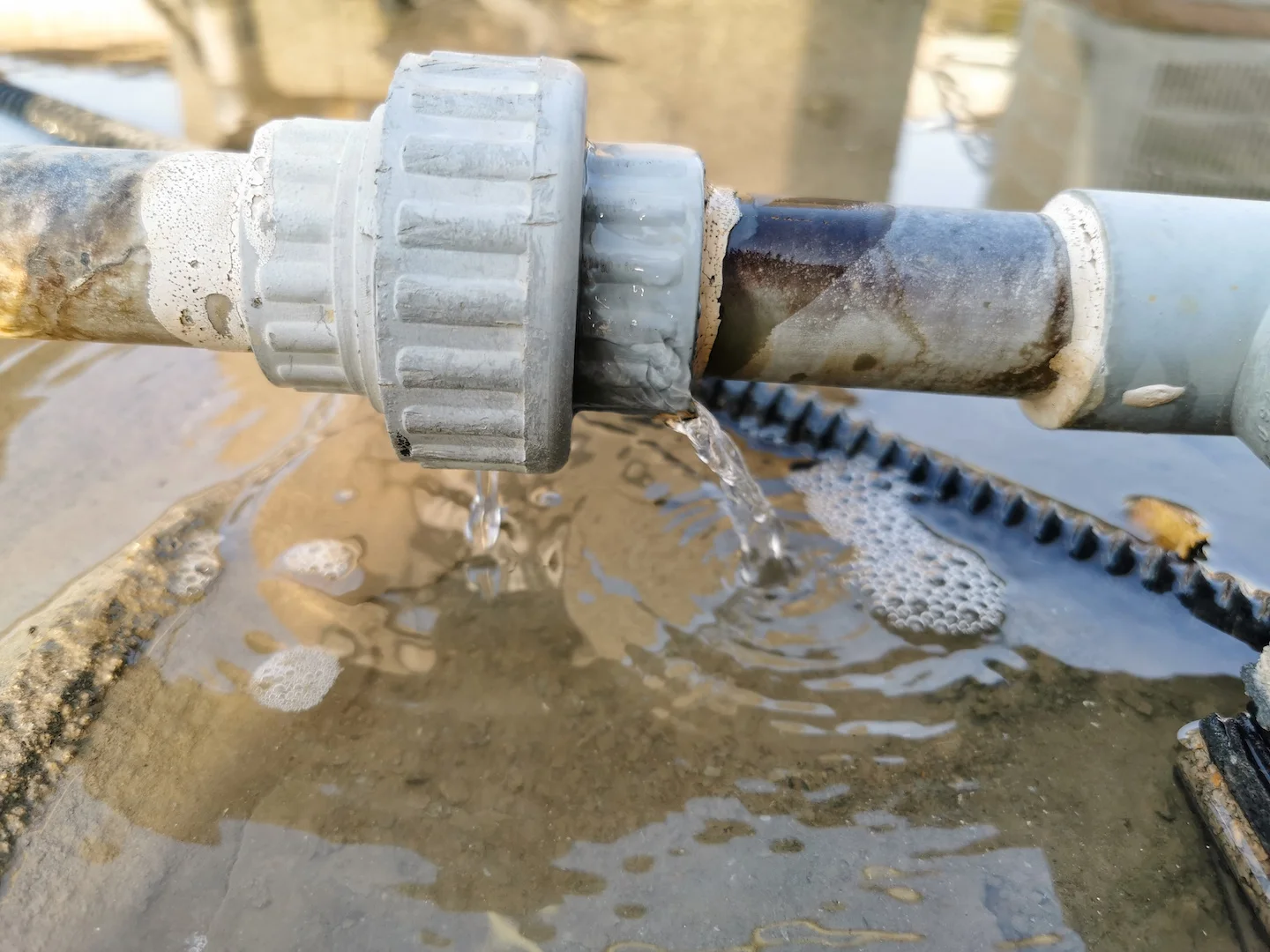Are you noticing water leakage from your air conditioner in Orlando? Don’t fret – you’re not alone. Air conditioner leaks can be a common issue, especially in warmer, humid climates like Orlando. Understanding the causes and solutions can help you address the problem effectively. Keep reading to learn why your air conditioner might be leaking water and how TemperaturePro Orlando can help.

In What Conditions Does an Air Conditioner Leak Water?
Air conditioning units typically freeze when there is a combination of low outdoor temperatures and high humidity levels, along with certain internal issues within the unit. Here are some conditions that can lead to an air conditioning unit freezing:
- Low Outdoor Temperatures: When the outdoor temperature drops below a certain threshold, typically around 60°F (15.5°C) or lower, the temperature of the refrigerant and evaporator coil can drop to a point where condensation freezes on the coil.
- High Humidity Levels: High humidity levels can cause more moisture to accumulate on the evaporator coil. When this moisture freezes, it can form ice on the coil.
Understanding Air Conditioner Leaks
Air conditioners produce condensation as they cool the air, which typically drains away through a designated drainage system. However, several factors can lead to water leakage:
Clogged Drain Line: Over time, dirt, dust, and algae can accumulate in the drain line, obstructing proper drainage and causing water to overflow.
Dirty Air Filter: A dirty air filter restricts airflow, leading to ice formation on the evaporator coil, which can melt and result in water leakage.
Low Refrigerant Levels: Low refrigerant levels can cause the evaporator coil to freeze, leading to water leakage as the ice melts.
Damaged Components: Cracked drain pans, faulty condensate pumps, or damaged coils can also contribute to water leakage issues.
Troubleshooting a Clogged Drain Line
Troubleshooting and repairing a clogged drain line in your air conditioning system can be relatively straightforward with the right approach. Here’s a step-by-step guide:
- Locate the Drain Line: The drain line is typically a PVC pipe located near the indoor unit of your air conditioner. It may be attached to the drip pan or directly connected to the unit.
- Check for Signs of Blockage: Look for signs of water accumulation or leakage around the indoor unit. If there’s standing water, it’s likely that the drain line is clogged.
- Inspect the Drain Line: Visually inspect the drain line for any visible blockages, such as dirt, debris, or algae buildup. You may need to remove the access cap or cover to inspect the line thoroughly.
- Test Drainage: Pour a small amount of water into the drain pan or directly into the drain line. If the water drains slowly or not at all, it’s a sign of a clog.

Troubleshooting a Dirty Air Filter
Troubleshooting and repairing a dirty air filter in your air conditioning system is a simple task that can have a significant impact on your system’s performance. Here’s how to do it:
- Locate the Air Filter: The air filter is typically located either behind the return air grille or inside the air handler/furnace unit. Refer to your system’s manual if you’re unsure of its location.
- Inspect the Air Filter: Remove the air filter from its housing and visually inspect it for dirt, dust, and debris. Hold the filter up to a light source; if you can’t see light through the filter, it’s likely clogged and needs cleaning or replacement.
Testing for Low Refrigerant Levels
Testing for low refrigerant levels in your air conditioning system typically requires specialized equipment and is best left to professional AC repair technicians. However, there are a few signs you can look out for that may indicate low refrigerant levels:
- Reduced Cooling Capacity: If your air conditioner is struggling to cool your home adequately, even when set to the lowest temperature, it could be a sign of low refrigerant levels.
- Warm Air Coming from Vents: If the air blowing from your vents feels warmer than usual, it may indicate insufficient refrigerant to absorb and transfer heat effectively.
- Ice Buildup on the Evaporator Coil: While this can also be caused by other issues like restricted airflow, ice buildup on the evaporator coil can sometimes indicate low refrigerant levels.
- Hissing or Bubbling Noises: If you hear unusual hissing or bubbling noises coming from your air conditioning system, it could be a sign of refrigerant leaks.
If you notice any of these signs, it’s important to contact a professional HVAC technician to diagnose and address the issue. Attempting to handle refrigerant-related problems without the proper training and equipment can be dangerous and may result in further damage to your system. A qualified technician will use specialized tools such as pressure gauges and leak detectors to accurately assess refrigerant levels and identify any leaks that need repair.

Testing for Damaged Components
Testing for damaged components in your air conditioning system typically involves a combination of visual inspection, listening for unusual noises, and occasionally using diagnostic tools. Here’s how you can test for common damaged components:
- Visual Inspection: Inspect all visible components of your air conditioning system, including the indoor and outdoor units, for signs of damage such as cracks, rust, corrosion, or loose connections. Pay particular attention to components like the condenser coils, evaporator coils, drain pan, and refrigerant lines.
- Listening for Unusual Noises: Turn on your air conditioner and listen for any unusual noises such as grinding, squealing, rattling, or banging. These noises can indicate problems with components like the blower motor, compressor, fan blades, or belts.
- Checking Electrical Connections: Inspect the electrical connections and wiring throughout your air conditioning system for signs of wear, fraying, or damage. Ensure that all connections are tight and secure to prevent electrical issues.
- Testing Capacitors: Capacitors are responsible for starting and running the motors in your air conditioner. Using a multimeter, you can test the capacitance and voltage of the capacitors to ensure they are within the manufacturer’s specifications. Faulty capacitors can cause issues like motor failure or irregular operation.
- Measuring Voltage and Current: Use a multimeter to measure voltage and current at various points in your air conditioning system, including the compressor, fan motor, and control board. Abnormal voltage or current readings can indicate issues with components or electrical problems.
- Inspecting Refrigerant Levels: While testing for damaged components, it’s also essential to check refrigerant levels and inspect for leaks. Low refrigerant levels can indicate leaks or other problems with components like the evaporator coil, condenser coil, or refrigerant lines.
If you’re unsure about how to test for damaged components or lack the necessary tools and expertise, it’s best to contact a professional HVAC technician. They have the knowledge and experience to diagnose issues accurately and recommend appropriate repairs or replacements to restore your air conditioning system’s performance and efficiency.
Solutions from TemperaturePro Orlando
If you’re experiencing air conditioner leaks in Orlando, TemperaturePro Orlando offers reliable solutions tailored to your needs:
- Thorough Inspection: Our experienced technicians will conduct a comprehensive inspection of your air conditioning system to identify the root cause of the leak.
- Professional Maintenance: We provide professional maintenance services, including cleaning or replacing air filters, unclogging drain lines, and checking refrigerant levels to ensure optimal performance.
- Expert Repairs: If your air conditioner requires repairs, our technicians have the expertise to address issues promptly and effectively, from repairing damaged components to fixing refrigerant leaks.
- Preventive Measures: We can also recommend preventive measures to minimize the risk of future leaks, such as regular maintenance schedules and humidity control solutions.
Trust TemperaturePro Orlando for Reliable HVAC Services
TemperaturePro Orlando is your trusted partner for all your heating and air conditioning needs in the Orlando area. As a locally owned and operated business, we take pride in serving our community with honesty, excellence, and accountability.
If you’re asking yourself – “why is my air conditioner leaking water?” – give us a call and see how we can help! We understand the unique challenges of Orlando’s climate and can provide tailored solutions to keep your home comfortable year-round.
Don’t let air conditioner leaks disrupt your comfort. Contact TemperaturePro Orlando today for expert HVAC services you can rely on.








